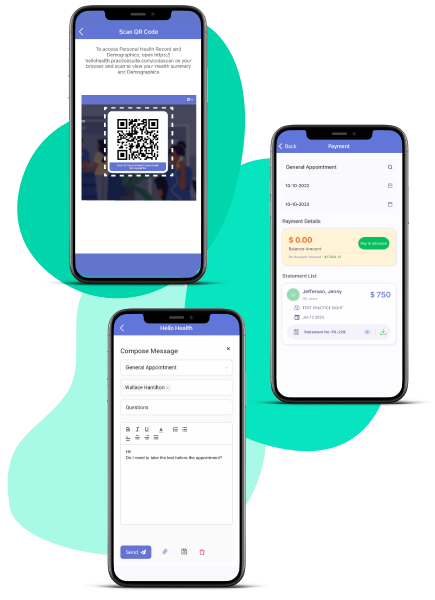The Importance of Digital Communication Channels

The Importance of Digital Communication Channels
Today we’ll speak about the Importance of Digital Communication Channels in healthcare. Digital channels such as two-way messaging, broadcast messages, and app notifications enable healthcare practices to streamline communication, reach patients more effectively, and increase engagement.
Using these tools strategically can improve the patient experience, appointment attendance and long-term relationships with patients.
Why Digital Communication is Important in Healthcare
Patients expect convenience and accessibility. The Pew Research Center found that 97% of Americans own a cellphone and 92% use text messaging.
Using digital communication, healthcare practices can reach patients in ways that fit their lifestyles. In addition to convenience, digital channels provide support for timely, personalized and consistent outreach.
This capability allows practices to increase patient engagement, decrease missed appointments, provide follow-up care and share important health information in real-time.
Two-Way Secure Text Messaging: Real-Time and Direct Communication
Text messaging is one of the most effective digital communication tools for healthcare practices. It provides a direct, immediate connection to patients right in their pockets.
Benefits of Text Messaging in Healthcare
Appointment Reminders: It has been proven that text reminders reduce missed appointments. Practices can send automated text messages a few days and hours before scheduled appointments to remind patients of their appointments, increasing attendance and reducing no-shows.
Follow-Up Care/Post-Appointment Instructions: After a procedure or consultation, follow-up instructions are sent by text to ensure patients have the correct information at hand. For example, if a patient had minor surgery, the practice could text recovery tips and reminders to take prescribed medications.
Implementing Text Messaging
Healthcare providers should use secure two-way text messaging to deliver clear, concise messages that adhere to privacy regulations (such as HIPAA). Patient consent is necessary, and practices should allow patients to opt out of messaging.
Broadcast Messages: A Lifeline for Emergencies and Updates
Broadcast messaging is a tool that allows healthcare practices to send a single message to all patients or a particular group at once. This is useful in situations that require urgent communication or updates.
Benefits of Broadcast Messaging in Healthcare
Notifications for emergencies: In times of public health crises or natural disasters, broadcast messages may quickly inform patients of closures, emergency protocols, or safety guidelines.
Appointment Delay or Cancellations: If a provider is late or a clinic has to close unexpectedly, broadcast messages can inform all scheduled patients promptly, saving time and frustration.
Weather-Related Updates: In areas of extreme weather, broadcast messages may alert patients to possible schedule changes because of storms, floods, or other adverse conditions.
Health Campaigns and Promotions: Practices can send mass notifications about upcoming vaccination drives, free health check-ups, or new services.
Policy Changes/Important Announcements: Broadcast messages can share information such as new office hours, contact numbers, or insurance policy changes.
Seasonal Health Alerts: Inform patients of seasonal health concerns like flu season reminders or allergy updates to promote preventive care.
How to Implement Broadcast Messaging Effectively
To maximize the impact of broadcast messaging, practices should:
- Segment messages to send to only relevant groups and eliminate unnecessary notifications.
- Keep messages short, simple and actionable.
- Ensure compliance with HIPAA and other privacy regulations by using secure messaging platforms like HelloHealth.
- Ask for patient consent to receive broadcast messages to maintain trust and avoid overcommunication.
App Notifications: Interactive and Convenient Communication
Mobile health apps like HelloHealth are transforming how patients use services like appointment scheduling and medication reminders. App notifications are an excellent way to engage patients and give individuals much more control of their healthcare.
Benefits of App Notifications in HealthCare
Medication and Appointment Reminders: App notifications can remind patients to take their medicine, refill prescriptions, or attend their appointments. These notifications are more interactive and customizable so that patients can interact with the reminder directly in the app.
Wellness Tracking and Health Habits: Some healthcare apps let patients track their exercise, diet, sleep, or other health behaviors. Practices can encourage patients to keep up these habits through app notifications.
Real-Time Health Alerts: In times of health emergencies or outbreaks, app notifications can be used to share important information quickly. For example, a COVID-19 outbreak in a specific area may send patients alerts with information on prevention or testing locations.
Making the Most of App Notifications
App notifications should be patient-specific. Overly frequent or irrelevant notifications may prompt patients to disable them. Practices should create value-added notifications that help patients manage their healthcare more efficiently.

